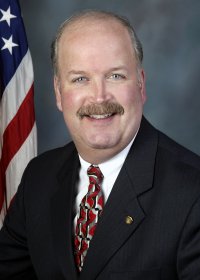Despite budget struggles, PA General Assembly sitting on big cash

By Andrew Staub | PA Independent
HARRISBURG, Pa. — Pennsylvania might be facing a two-year deficit of $1.4 million, but not everybody is hurting.
Aside from their $84,000 base salaries, session-day per diems and public pensions, Pennsylvania lawmakers had a reserve fund of more than $153 million as of June 30, 2013, according to an audit report released Wednesday. At the close of the last fiscal year, the state House had $71.8 million stashed away, while the state Senate had $50.2 million.
Those figures are obviously outdated — a product of the Legislative Audit Advisory Committee meeting six months later than usual to accept the audit report of the General Assembly’s finances for fiscal year 2012-13.
KELLER: Reluctantly took the job as chairman of the Legislative Audit Advisory Committee. Now, he’s being questioned about the General Assembly’s vast reserves.
Republican state Rep. Mark Keller, the chairman of the committee, said he didn’t know how much is currently in reserve, but noted he’s heard it’s lower than $153 million. Spokesmen for the House and Senate majority leaders also didn’t have current numbers.
The big question is how the reserve could be used, especially with the Independent Fiscal Office anticipating the state will finish the current fiscal year more than $570 million in the red.
“I can’t answer that,” Keller said, when asked if it could be used to put a dent in the revenue shortfall.
In the past, the reserves have been used to help fund the Hazardous Sites Cleanup Fund and Accountability Block Grants for public schools.
“No decision has been made in that regard this year, but it will be part of the discussion,” said Erik Arneson, a spokesman for Senate Majority Leader Dominic Pileggi, R-Chester.
The reserves also provide a cushion in the case of a budget stalemate, said Steve Miskin, a spokesman for the House GOP. In 2009, a fiscal battle between Republican lawmakers and former Gov. Ed Rendell, a Democrat, delayed the state budget by more than 100 days.
Current Gov. Tom Corbett, lobbying for pension reform, has already said he’s willing to miss the June 30 deadline this year, raising the possibility the reserve fund might be needed.
“It’s basically so that a governor cannot extort the Legislature,” Miskin said.
Gene Stilp, a Harrisburg activist turned state House candidate, believes there are better uses — such as using the reserve to deal with a revenue shortfall, which he said would reduce the burden on taxpayers.
The General Assembly could survive on limited resources in the case of a budget battle, Stilp said.
“Sure the Legislature may have to go without bread and water for a little bit — excuse me, would have to go without wine and cheese for a little while and cake — but that’s OK because it would make them work harder,” he said.
The audit report arrived late this year after the former committee chairman resigned. Keller said he didn’t originally want the chairman post, but took the job after House Speaker Sam Smith, R-Jefferson, came up empty in his search.
Ensuring scheduling conflicts pushed the meeting until June, Keller said.
“It’s nobody’s fault,” he said.
The committee finally met, though, and approved the audit report in a half-hour-long meeting fraught with interruptions from Stilp and Eric Epstein of Rock the Capital. While his phone — with its quacking duck ringtone — went off twice, Stilp also interjected with a question almost immediately after the proceedings began.
“There is no public comment,” Keller said. “Gene, if you want to act like an adult, act like an adult. Sit down and let us conduct our business.”
Later, Epstein interrupted to ask when the last time an auditor was rotated, leading Keller to implore them to let the committee finish the meeting.
It wasn’t long before he chimed in again, this time as Stephen Baloga, a partner for Mitchell & Titus, the firm hired to complete the audit, noted that $150 been advanced for a Starbucks reward card. Baloga said the practice should be discontinued.
“But buying Starbucks is OK?” Epstein said, his words hanging in the air with no response from the committee.
Afterward, Stilp called the meeting a “total sham” and called for a more independent audit. Stilp could get his wish, too, as state Rep. Bob Freeman, D-Northampton, has introduced legislation that would require that the state auditor general audit the General Assembly.
Having the auditor general examine the Legislature’s finances would bring great oversight and a more public process, Freeman said in a statement.
“The auditor general is the chief watchdog of how state funds are spent,” Freeman said. “His office audits the various agencies of state government on a regular basis. Having the auditor general do the legislative audits will make it a more public and transparent process and has the added benefit of saving money since the need for hiring an outside firm would no longer be needed.”
Contact Andrew Staub at Andrew@PAIndependent.com. Follow @PAIndependent on Twitter for more.







